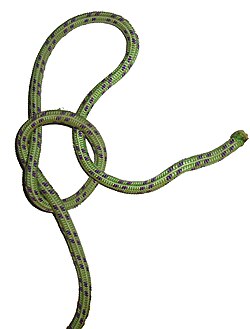Difference between revisions of "Translations:AY Honors/Knot/Slip/2/es"
From Pathfinder Wiki
m (FuzzyBot moved page Translations:Adventist Youth Honors Answer Book/Knot/Slip/2/es to Translations:AY Honors/Knot/Slip/2/es without leaving a redirect: Part of translatable page "Adventist Youth Honors Answer Book/Knot/Slip") |
|||
| Line 7: | Line 7: | ||
| warnings = Si atada como se muestra en la ilustración, el extremo (a la derecha) se resbalará a través del bucle si la más mínima carga se aplica al otro extremo (a la izquierda). Si uno invierte los extremos en la ilustración, el nudo es mucho más estable. Como se muestra en la imagen, el nudo aguantará una carga en el extremo a la derecha, pero no en el otro extremo. | | warnings = Si atada como se muestra en la ilustración, el extremo (a la derecha) se resbalará a través del bucle si la más mínima carga se aplica al otro extremo (a la izquierda). Si uno invierte los extremos en la ilustración, el nudo es mucho más estable. Como se muestra en la imagen, el nudo aguantará una carga en el extremo a la derecha, pero no en el otro extremo. | ||
}} | }} | ||
| − | |||
<noinclude> | <noinclude> | ||
Latest revision as of 20:59, 26 July 2022
| Nudo corredizo |
|---|
|
Uso: El nudo corredizo es uno que se apretará bajo carga y que puede ser fácilmente desatada halando el extremo corriente. Este nudo es típicamente un componente de los nudos más complicados y generalmente no se utiliza por sí mismo.
Cómo amarrar:
ADVERTENCIA: Si atada como se muestra en la ilustración, el extremo (a la derecha) se resbalará a través del bucle si la más mínima carga se aplica al otro extremo (a la izquierda). Si uno invierte los extremos en la ilustración, el nudo es mucho más estable. Como se muestra en la imagen, el nudo aguantará una carga en el extremo a la derecha, pero no en el otro extremo.
|

